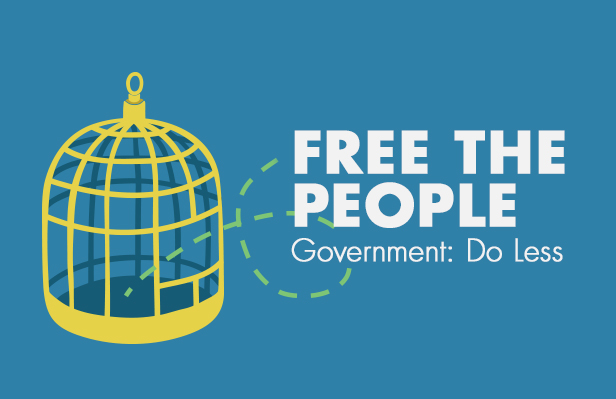Commentary

Government Should Do Less So We Can Do More
Note: This commentary was published at PennLive, the York Daily Record, the Pittsburgh Tribune-Review, and many other news outlets across the state.
Prosperity or ruin? In theory, it’s a simple choice with an obvious answer. But in practice, complicating factors make the decision anything but easy.
In the political world, appeasing special interests with new programs and promises of more government spending is often an easier choice than spending responsibly. Yet, if we don’t take the responsible road, our final destination could be fiscal and economic decline, as witnessed in states like Illinois and cities from Scranton to Detroit.
In contrast to the rhetoric, making government live within its means isn’t restrictive, heartless, or unfair—it’s freeing. Responsibly managing state spending, and the taxes that fund it, frees government up to focus on a limited mission without placing an undue burden on our families, friends, and neighbors.
Reducing the burden on families and entrepreneurs frees up resources so we can create jobs, invest in the future, provide for our children, and contribute to charities and civic organizations to help those in need.
Unfortunately, Pennsylvania’s history of unrestrained spending has made it harder for Pennsylvanians to be more charitable. In 1970, state government spent $8,500 per family of four. Today, that number stands at $22,350—an inflation-adjusted 162 percent increase.
The consequences of out-of-control spending growth have been brutal for families and business who now face the tenth-highest state and local tax burden in the country. Incredibly, this burden includes the highest effective corporate tax rate in the world. Yet, while state revenues are projected to reach an all-time high, calls for higher taxes persist.
A responsible budget doesn’t require higher taxes and more spending. Instead, Pennsylvania must spend smarter.
In the weeks ahead, we’ll be hearing about Governor Wolf’s budget priorities. If he’s committed to spending smarter, he can do so by supporting a budget that respects three overriding principles: Protect families and businesses from tax increases, avoid spending more than revenue, and limit spending to inflation plus population growth, as outlined by the Taxpayer Protection Act.
If spending were frozen at current levels—the highest in history—the projected $1.7 billion deficit would disappear. That’s right, the budget gap can be eliminated without reducing current spending levels or raising taxes on working families by one dime.
Short of a spending freeze, one fiscally responsible solution that should have bipartisan support is corporate welfare reduction.
Pennsylvania beat out all other states in corporate welfare spending from 2007 to 2014—which is nothing to celebrate. This type of spending hands out tax dollars based on political calculations, thereby stifling economic progress. Since 2007, states spending the most on corporate welfare had slower economic growth than states that spent the least.
If some of the most wasteful business subsidies were eliminated, taxpayers could save $675 million—money that could be used by those who earned it to invest in their own communities.
Traditional welfare spending, which has grown far beyond the rate of inflation and population growth, could also be slowed—not cut!—to save $300 million this year.
Smart funding, rather than more funding, would also transform our education system without further burdening taxpayers. The key is Weighted Student Funding, which assigns funds based on students’ needs. The “hold harmless” policy that governs state aid to school districts today perversely punishes growing districts and rewards districts with shrinking student populations.
By adopting a weighted funding model, we can help reduce the forecasted deficit and ensure that education dollars follow scholars. In essence, we can fix inequity in the public education system without targeting energy producers and consumers with additional taxes.
Finally, lawmakers could consider reprioritizing funds. The total operating budget includes more than 158 “special” or “other” funds, costing taxpayers more than $18 billion this year in addition to the General Fund Budget. Reducing some of these funds to fund more pressing priorities—like pensions—is the smart course of action.
These solutions would avoid the problem of overspending, which makes it difficult for government to perform even its core functions, and allow struggling families to keep more of what they earn, so they can make ends meet.
# # #
Nathan A. Benefield is vice president of policy analysis for the Commonwealth Foundation (CommonwealthFoundation.org), Pennsylvania’s free market think tank.